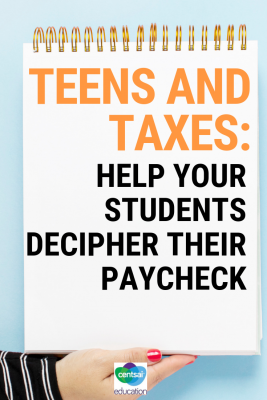CEE Standard: Earning Income
Do any of your students have a part-time job? If so, they are most likely going to have to pay taxes. Paying taxes is a learning curve and everyone needs to be taught how it works and what their taxes pay for in the United States. Take your students through this article to learn the basics of filing taxes.
 There is nothing else in this world like getting your first legit paycheck. After working hard for two weeks or a month, you get to cash in and reap the rewards. But hold it! Your paycheck means more than a trip to the bank. It may mean having to file your taxes.
There is nothing else in this world like getting your first legit paycheck. After working hard for two weeks or a month, you get to cash in and reap the rewards. But hold it! Your paycheck means more than a trip to the bank. It may mean having to file your taxes.
This year, thousands of teens will file taxes because of earnings from their part-time jobs or investments. “I had no idea I had to file taxes until a friend mentioned it when we got our W-2 forms.” said Madison Sero, a 15-year-old retail employee. “It’s pretty intimidating. I don’t know where to start.”
Here are some basic points teens and taxes:
The first thing you will need to figure out is if you’re a dependent or independent. Ask yourselves these questions to find the answer:
- Are you under the age of 19 or under the age of 24 and a full-time student?
- Do you live with a parent or guardian more than 50 percent of the year?
- Is your paycheck supplemental (meaning you don’t use it to pay for all your groceries, housing, medical expenses, etc.)?
If you answered yes to all three, then you’re a dependent. Most teens are dependents because they live with their parents or a guardian.
Do I Need to File?
Now, you need to know if you need to file or not based on how much you made. You’ll find this information on the W-2 form your employer gave to you. If the total is over $6,300, then you need to file.
Maybe you’re in business for yourself (high-fives for that). As a self-employed teen or a contractor, you will need to file if you made more than $600. If you receive a form labeled as a 1099-MISC from your employer, you’re considered self-employed or a contractor.
Even if you earned under that $6,300 mark, you may still want to file. Helena Swyter, a certified public accountant (CPA) and owner of Sweeter CPA, explains: “Say you earned $6,000 from a part-time job and had state and federal withholdings on your income. You may qualify to get some of that back so it would be worth filing, even though your income was below the cutoff.” Getting money back? Cha-ching!
In some cases, you may not have worked at all. Instead, you may have earned money by having investments, such as a college fund, in your name. If you made over $1,050 in interest, you’d need to file. This money is called “unearned income.”
If your income from working and interest is above $1,050, you may need to file. For example, if you made $800 from your summer job and $300 from interest, you would have to file because the total is over $1,050. Confusing? This situation is where a tax expert and your parents’ know-how should come in to help better understand this tricky scenario.
How Do I File?
In most cases, filing shouldn’t take more than a few hours. Having an expert help prepare it is pretty standard, but using free software or online programs can be an excellent choice for cases where there aren’t any earned income questions or if you’re not a contractor or self-employed.
Amber Larsen, a CPA and tax manager at DHJJ, encourages new earners to jump right in and learn the inner workings of tax filing. “It helps the teen be part of the process and the timeline, and teaches them about how their paycheck is divided up — some to federal withholding, some to state withholding, some to Social Security/Medicare, and some to them.
When teens do the return themselves, they can then be part of how the tax system works and can see where their money is going. And if they get a refund, doing their tax return might become one of their favorite parts of the spring!”
Madison Sero completed her tax forms at the end of January, and to her surprise, will receive over $200 back from her part-time retail job! “It was so much easier than I thought, and I feel like I could do this all on my own next year.”
The deadline to submit your completed taxes is normally on April 15, but you should double-check (the date can change by a couple of days depending on the year).
While that seems like a lot of time, you don’t want to procrastinate — or worse, risk losing an important document or forgetting to file your taxes altogether. Plus, if you do take your taxes to an expert, you may risk them being too busy to see you or possibly charging you a higher fee for last-minute appointments!
- Based on the questions above, are you a dependent?
- Do you have a specific place you keep all of the important documents (like your W-2) you receive from your bank or employer? If not, make one!
- Did you earn more than $600 working for yourself?
- Did you earn more than $6,300 from your employer?
- Will you use a tax professional, or go through a free online service?

